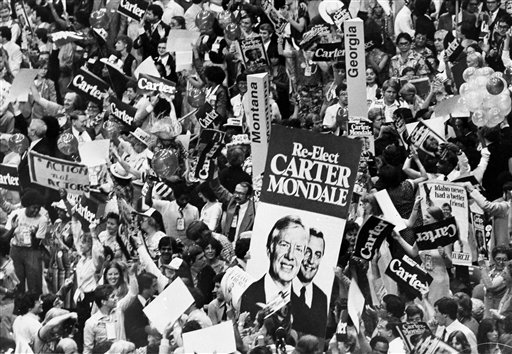In Democratic Party of United States v. Wisconsin ex rel. LaFollette, 450 U.S. 107 (1981), the U.S. Supreme Court ruled that state laws attempting to dictate how delegates vote at national party conventions violate the associational rights of political parties.
Wisconsin law dictated how Democratic delegates could vote
Democratic Party Selection Rule 2A for the 1980 national convention restricted participation in the delegate selection process to Democratic voters “who publicly declare their party preference and have that preference publicly recorded.” This rule conflicted with a Wisconsin electoral statute allowing members of competing political parties, as well as independents, to vote in the state’s “open” Democratic primary without having declared their Democratic Party preference.
In addition, Wisconsin law required that delegates selected under this system vote in accordance with the results of the primary election.
Supreme Court said law violated First Amendment
The national Democratic Party indicated its intent to refuse to seat delegates selected through Wisconsin’s primary process. In response, the Wisconsin attorney general brought a declaratory action seeking a court determination affirming the constitutionality of the statute.
The Wisconsin Supreme Court entered an order upholding the provision. The U.S. Supreme Court reversed, ruling that the provision violated the freedom of association guaranteed by the First Amendment.
Justice Potter Stewart, writing for the Court, framed the issue as a question of “whether, once Wisconsin has opened its Democratic Presidential preference primary to voters who do not publicly declare their party affiliation, it may then bind the National Party?”
Court said political parties enjoy First Amendment associational rights
The justices determined that organizations such as the Democratic Party enjoy constitutionally protected First Amendment associational rights that are implicated when a state defines the set of individuals eligible to pass judgment on an important party matter, such as delegate selection.
The Wisconsin Supreme Court had argued that the burden imposed on the national party was a minor one. Stewart judged this largely immaterial because courts should not interfere with a decision or expression of a party even if it finds that expression “unwise or irrational.”
Court said party delegates did not have to vote with the results of the primary
The Court also carefully considered whether the state proffered a sufficiently compelling rationale to justify the regulation. The state asserted interests in preserving the overall integrity of the electoral process, furthering the secrecy of the ballot, increasing primary participation, and preventing voter harassment.
Although the Court recognized the importance of these goals, the majority concluded that each of the interests “go to the conduct of the Presidential preference primary — not to the imposition of voting requirements upon those who, in a separate process, are eventually selected as delegates.”
Therefore, the Court rejected the requirement that Wisconsin’s party delegates vote in accordance with the results of Wisconsin’s open primary.
Justice Lewis F. Powell Jr. authored a dissenting opinion, joined by Justices Harry A. Blackmun and William H. Rehnquist, denying that Wisconsin’s regulation substantially burdened freedom of association.
This article was originally published in 2009. Daniel M. Katz is a Professor of Law at the Chicago-Kent College of Law.

